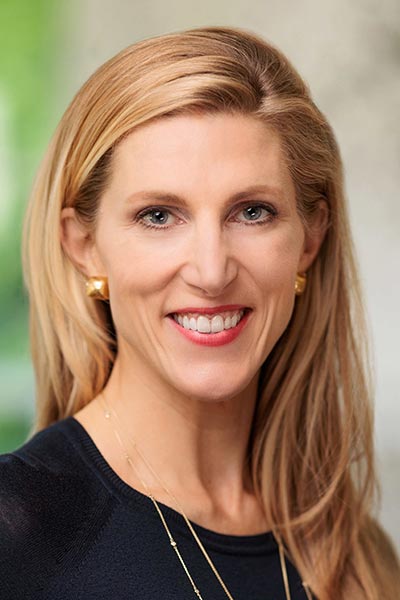
The world is facing a climate and health pandemic, said Vanessa Kerry, MD, MSc, who will deliver the keynote address during the CHEST 2024 Opening Session.
“The climate crisis is, without question, driving all disease burdens,” Dr. Kerry said. “It’s very real for us as pulmonary and critical care clinicians and caregivers in terms of what we see and our ability to protect our patients, both informing them how they can care for themselves and also advocating for things that can protect the environment at the same time they protect our patients.”
The Opening Session will convene Sunday morning, October 6, in the Boston Convention & Exhibition Center Ballroom. The event will begin at 8 am ET—a change from the afternoon kickoffs of previous years.
“Climate change is here, and we are feeling the effects every day,” she said, citing increases in extreme weather events and an acceleration in the amount of greenhouse gases being put into the atmosphere. More than 8 million deaths worldwide are linked to air pollution annually, and extreme heat has led to an increase in the amount of heat strokes, cardiovascular events, kidney failures caused by dehydration, and mental health burdens associated with climate anxiety.
Dr. Kerry is a pulmonary and critical care physician and the Director of Global and Climate Health Policy in the Department of Environmental Health at Harvard T.H. Chan School of Public Health. In June 2023, she was appointed as the World Health Organization Special Envoy for Climate Change and Health to advocate for investments to address the growing effects of climate change on the world’s health. Dr. Kerry is also the cofounder and CEO of Seed Global Health, a nonprofit organization focused on strengthening and transforming health systems through long-term investments and training of the global health workforce. In 2015, Dr. Kerry was the recipient of a CHEST grant to strengthen critical care training in Tanzania.
“The grant and the investment of the CHEST organization in our work were a testament of being willing to push the imagination beyond the idea that global health is about HIV, TB, and malaria,” Dr. Kerry said. “Noncommunicable diseases and cardiovascular disease are now the leading causes of death globally, and the majority of those deaths are happening in [resource-limited] settings. We have the ability to intervene and change those outcomes, but we have to have the imagination and commitment to be willing to partner [with] and train a health workforce to build those best practices.”
Working in diverse settings around the world—from world-class ICUs during the height of the COVID-19 pandemic to rural clinics in Rwanda with limited access to equipment to provide services beyond a chest radiograph—she has witnessed the universal nature of many of the challenges to providing care. The training and resources of the health care team create a divide between being able to effectively rise to meet those challenges and failing to do so.
“Patients will suffer from the vulnerability of being sick [and] the inability to care for their family, to go to work, and to do their lives,” Dr. Kerry said. “It’s just the resources that are available to care for them are very, very different. You can go from one setting where we have ECMO (extracorporeal membrane oxygenation) to a setting where you’re fighting to find an antibiotic to give.”
These experiences were foundational to the impetus to create Seed, which has helped educate more than 42,000 health professionals in seven countries, serving more than 76 million people.
“It felt fundamentally unacceptable that there were two standards of care in the world,” Dr. Kerry explained. “That drove me to want to figure out ways that we could bring clinical excellence and practice improvements to help support the health workers [who] and places that are [resource-limited and] to be able to have the same kind of outcomes that we might see here in the United States.”
In lieu of traditional honorarium for a keynote speaker, CHEST will make a donation to Seed. The donation will provide full scholarships for two family medicine students in Malawi and two emergency medicine students in Uganda.
Climate change has made it more difficult to achieve the organization’s objective of practice improvements and support for health care workers because as climate change advances, the associated burdens of disease mount.
“We’ve been seeing shifts in disease, and the work is getting harder for the health care workers. We all lived through the COVID pandemic, and it was devastating. It was exhausting, and it was truly an extraordinary moment in our clinical lives,” Dr. Kerry said. “But the reality is because of climate change, there’s a 50% chance of another COVID-like pandemic occurring in the next 20 to 25 years.”
This evolving risk disrupts individual well-being and health care services far and wide.
“People don’t realize, and we as physicians don’t realize enough, that climate change is absolutely undermining our social, political, and economic determinants of health in a way that makes it much harder for us to do our jobs,” Dr. Kerry said. “We need to engage and think differently about how we practice our field now.”
Inhalers are just one example of many things the health sector could change in order to reduce emissions, she explained.
Dr. Kerry has published prominently, including in the New England Journal of Medicine, Lancet, and British Medical Journal, and serves on the editorial boards of the New England Journal of Medicine Evidence and Annals of Global Health.
Join us at CHEST 2025
Save the date for the next Annual Meeting, October 19 to 22, 2025, in Chicago. CHEST 2025 will explore the latest advancements in pulmonary, critical care, and sleep medicine, with a focus on innovation and the future, just as the city itself embodies progress and reinvention.
